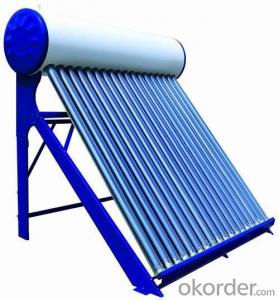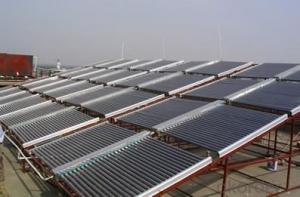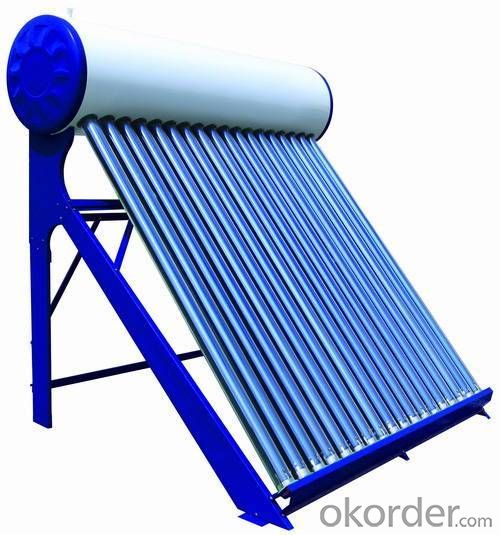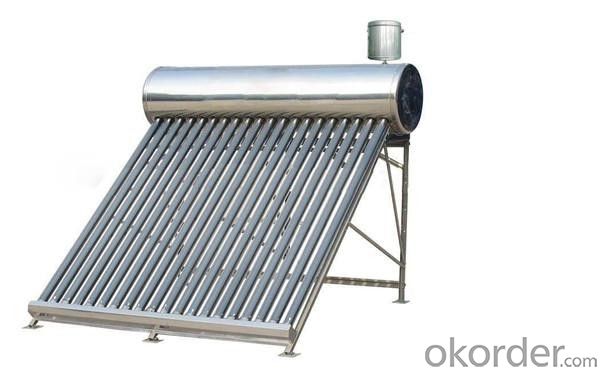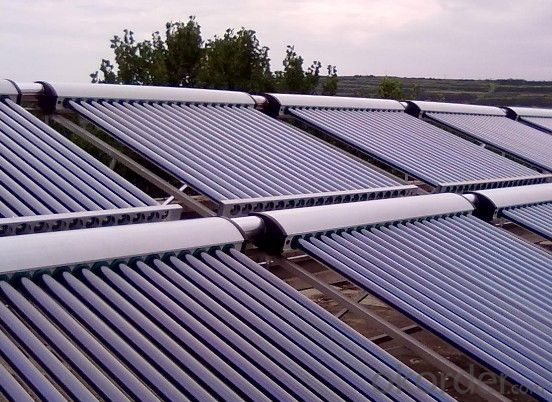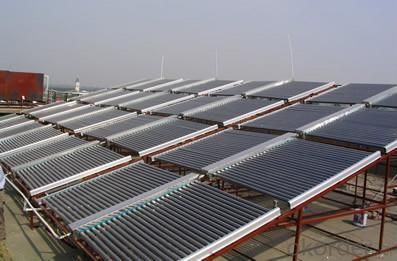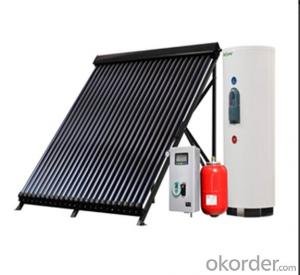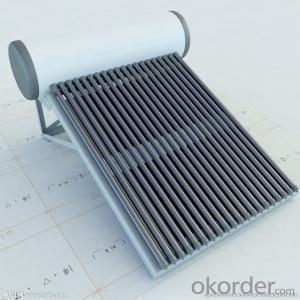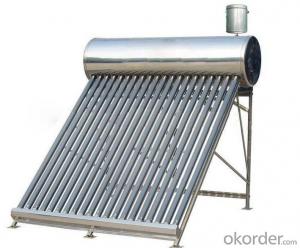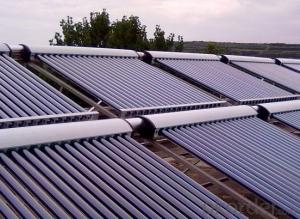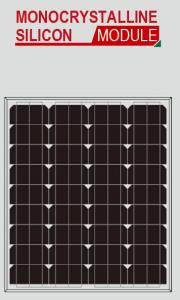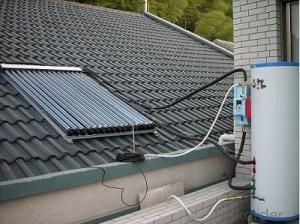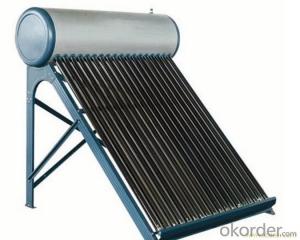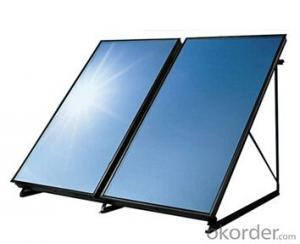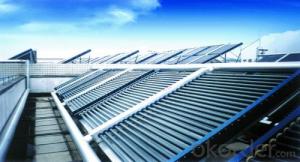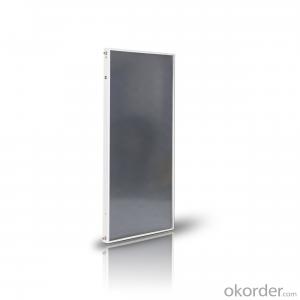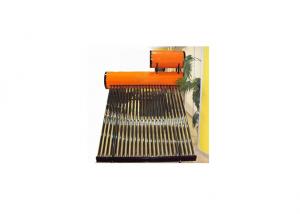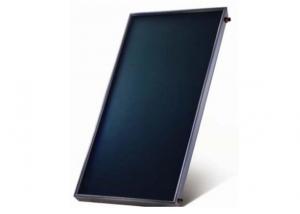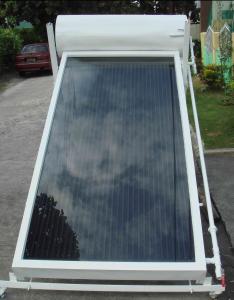2.0mm Thick Aluminum Pool Solar Water Heater for Household
- Loading Port:
- China main port
- Payment Terms:
- TT OR LC
- Min Order Qty:
- 10 set
- Supply Capability:
- 10000 set/month
OKorder Service Pledge
OKorder Financial Service
You Might Also Like
Solar water heaters features
1. The upright tank can make the water temperature to a high level. It can hot the water instantly
2. The tank inside the building, the hot water loses less energy than the normal one
3. The solar collector and the tank of solar water heater is separated, that makes the system combine with the building perfectly, which will reduce the sightseeing for the building and environment around
4. Back up with electric heater so that in the day without sunshine hot water can also be used
5. Can be combined with gas or electric heater
6. Max. Pressure: 12bar; Operating Pressure: 6 bar
7. It can be used for other function, such as warming
Solar water heaters working principle
1. The solar collector absorbs solar energy and transmits it to the solar water heater tank through circulation
2. When the temperature of the collector reaches the set value, the controller starts the circulation pump automatically
3. The circulation pump makes heat-conducting liquid circulate automatically
4. The heat-conducting liquid transfers heat to water by lower heat exchanger in the water tank.
5. When the temperature difference between solar collector and heat pipe solar water heaters tank doesn't reach the set value, the circulation pump will be shut automatically
6. In case the temperature of the water tank does not reach Tmax, Electric Heating Element will start to work automatically
Solar water heaters working station component:
1. Operating screen
2. Manometer
3. Pump speed adjust switches
4. Temperature difference circulation pump
5. Flow rate indicator
6. Return circuit connector
7. Safety valve
8. Expansion vessel connector9. Return circuit connector
10. Wall mounting
11. Expansion vessel:8L
12. Pressure resistance: 10 bar pressure for expansion vessel
Solar water heaters specification:
Description | solar water heaters |
Material of out manifold | 0.55mm thickness color steel/ fluorine carbon steel |
Material of inner tank | Food grade 2.0 mm thickness SUS304 stainless steel |
Tank insulating layer | 40mm 45kg/m³ high-density polyurethane foamed |
Inlet and outlet hole | Male G1'' |
Max pressure | 0.6 Mpa |
Solar collector tube | 3.3 Borosilicate glass with N/Al coating |
Thickness of glass tube | 1.6mm |
Vacuum tube tightness | P≤0.005 Pa |
Absorption | as=0.93-0.96 (AM1.5) |
Emission ratio | εh=0.04-0.06 (80C±5C) |
Idle sunning property parameters | Y=220~260m2.C/KW |
Average heat loss coefficient | ULT=0.6~0.7W/(m2.C) |
Bracket: | 2.0mm thickness aluminum alloy |
Tank weight | 75KGS |
Tank size | 560mm Dia x 1810mm Height |
Tank capacity | 300L |
Solar collector | 2pcs 58x1800x15tube solar collector |
Absorber area | 2.811 m² |
Working station | SP116 working station |
Heat exchanger length | Upper:12m, Underside:18m |
Solar water heaters details show:
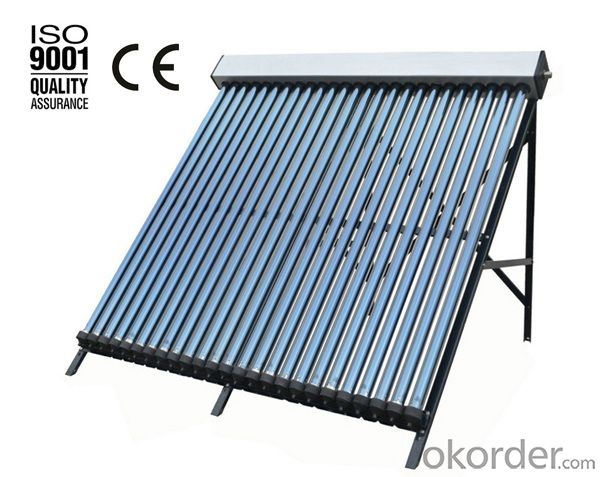
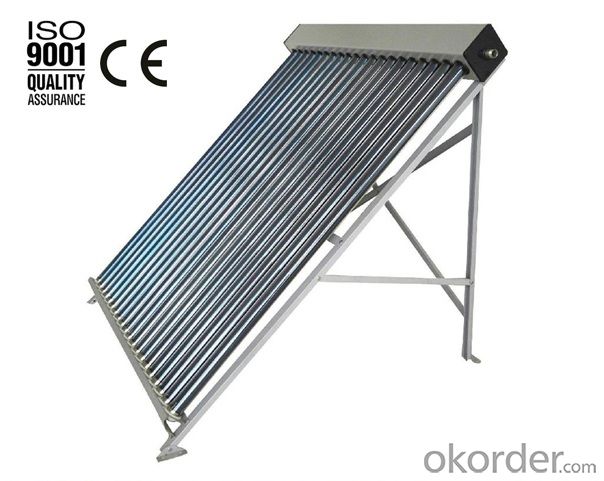
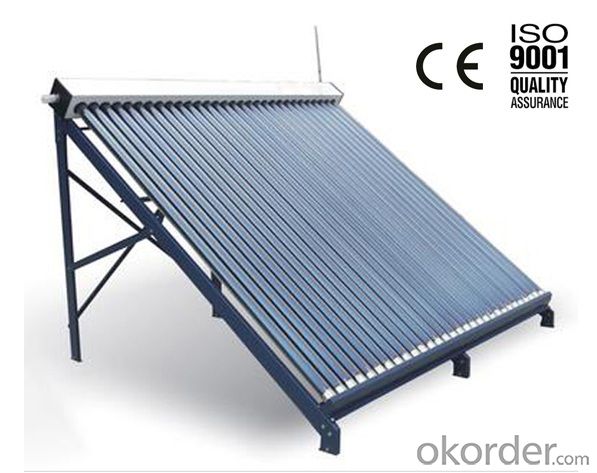
Benefits of this kind of solar water heaters:
1. Prolong the life of your existing water heater
2.Costs less than an electric, gas or oil water heater
3.No maintenance required
4.Lasts longer than a traditional hot water heater
5.Reduce your water heating costs
- Q: Can a solar water heater be used in areas with frequent hurricanes or storms?
- Yes, a solar water heater can be used in areas with frequent hurricanes or storms. However, it is essential to ensure that the system is properly installed and securely mounted to withstand strong winds and potential debris. Reinforcements and additional measures can be taken to protect the solar water heater during extreme weather conditions.
- Q: How does the size of a solar water heater system affect its performance?
- The size of a solar water heater system directly affects its performance as it determines the amount of hot water it can produce. A larger system with a larger collector area and storage tank can heat more water and meet higher demand, resulting in better performance. On the other hand, a smaller system may struggle to provide sufficient hot water, especially during periods of high demand or in colder weather.
- Q: Can a solar water heater be used in areas with high levels of water salinity?
- Yes, a solar water heater can be used in areas with high levels of water salinity. However, it is important to consider the impact of water salinity on the system's components, particularly the corrosion of pipes and tanks. To mitigate this, the system may require additional maintenance and regular cleaning to prevent any buildup or damage caused by the high salinity levels.
- Q: How does the efficiency of a solar water heater compare to a traditional water heating system?
- The efficiency of a solar water heater is generally higher than that of a traditional water heating system. Solar water heaters utilize the sun's energy to heat water, which is a renewable and abundant source. This allows them to operate with minimal energy consumption and lower utility costs. In contrast, traditional water heating systems rely on fossil fuels or electricity, which can be expensive and have a higher environmental impact. Overall, a solar water heater is a more efficient and sustainable option for heating water.
- Q: What is the payback period for a solar water heater?
- The payback period for a solar water heater varies depending on factors such as the initial cost, energy savings, and location. On average, it can range between 2 to 7 years, but in some cases, it can be as short as 1 year or extend up to 10 years.
- Q: The house is ready to install a solar water heater, but do not know what kind of good do not know how to distinguish between bad? Here's a home called "God" brand, do not know how this brand? Want to know friends with us!! thank you!.....
- 3 should also pay attention to the vacuum pipe between the pipe spacing, the general center distance between the two tubes should be around 70mm.4 home solar water heater bracket design should be reasonable, should have enough strength and stiffness to ensure adequate bearing capacity. In some areas of daily wind, especially in coastal areas, in the purchase of domestic solar water heaters should also pay attention to the product in the design of wind resistance.
- Q: How does the durability of a solar water heater compare to a traditional water heating system?
- The durability of a solar water heater is generally comparable to that of a traditional water heating system. However, since solar water heaters have fewer moving parts and rely on sunlight as their primary energy source, they may have a longer lifespan and require less maintenance compared to traditional systems. Additionally, solar water heaters are not prone to issues such as rust or corrosion that can affect traditional systems, which can contribute to their overall durability.
- Q: How does the design of the solar collector affect the efficiency of a solar water heater?
- Determining the efficiency of a solar water heater heavily relies on the design of the solar collector. The ability to capture and convert solar energy into usable heat plays a crucial role in this determination. One key aspect of the design involves the size and surface area of the collector. A larger surface area allows for more absorption of solar radiation, resulting in a greater amount of heat transferred to the water. Additionally, the shape and orientation of the collector also affect efficiency. A well-designed collector effectively captures sunlight throughout the day, maximizing the energy available for water heating. The choice of material used in the collector is another important consideration. Flat-plate collectors, which are commonly used in solar water heaters, consist of a dark absorber plate covered by a transparent cover. Copper or aluminum, materials with high thermal conductivity and absorption, are often utilized as the absorber plate. These materials efficiently absorb solar radiation and transfer heat to the water. The design of fluid flow within the collector is critical as well. The fluid, typically water or a heat-transfer fluid, circulates through the collector to absorb heat from the absorber plate and transport it to the storage tank. Optimizing the flow rate and pattern within the collector ensures efficient heat transfer. A well-designed collector minimizes heat losses due to conduction, convection, and radiation, maximizing heat transfer to the water. Efficiency is also influenced by the insulation and glazing of the collector. Insulation should minimize heat losses, especially during periods of low solar radiation or at night. Glazing, typically made of glass or plastic, traps heat within the collector while still allowing sunlight to pass through. The choice of glazing material and its transparency properties affect the amount of solar radiation transmitted into the collector and the amount of retained heat. To summarize, the design of the solar collector significantly affects the efficiency of a solar water heater. Factors such as size, shape, material, fluid flow, insulation, and glazing all contribute to the effective capture and conversion of solar energy into usable heat. By optimizing these design elements, the efficiency of a solar water heater can be greatly improved, providing a more sustainable and cost-effective solution for water heating.
- Q: Can a solar water heater be used in areas with limited access to maintenance expertise?
- Yes, a solar water heater can be used in areas with limited access to maintenance expertise. Solar water heaters are generally low-maintenance systems that require minimal expertise to operate. They have few moving parts and are designed to be durable and reliable. However, it is essential to ensure proper installation and initial maintenance to maximize the system's performance and lifespan. Additionally, providing basic training and educational resources to users can help address any minor issues that may arise.
- Q: How does the altitude of the location affect the boiling point of water in a solar water heater?
- The altitude of a location can have a significant impact on the boiling point of water in a solar water heater. As altitude increases, atmospheric pressure decreases, which in turn affects the boiling point of water. At higher altitudes, the boiling point of water is lower compared to lower altitudes. This phenomenon occurs because the boiling point of a liquid is directly related to the pressure exerted on it. At sea level, where atmospheric pressure is higher, water boils at 100 degrees Celsius (212 degrees Fahrenheit). However, as one moves to higher altitudes where atmospheric pressure is lower, the boiling point of water decreases. For example, at an altitude of 2,000 meters (6,500 feet), water boils at approximately 95 degrees Celsius (203 degrees Fahrenheit). In the context of a solar water heater, the altitude of the location affects the efficiency and performance of the system. Solar water heaters depend on the transfer of heat from the sun to heat the water. The system utilizes solar collectors to absorb sunlight and transfer the heat to the water. At higher altitudes, where the boiling point of water is lower, the water in the solar collector can reach its boiling point more easily. This can lead to the formation of steam bubbles within the collector, which can reduce the efficiency of heat transfer and potentially cause damage to the system. To address this issue, solar water heater manufacturers often take altitude into consideration during system design. They may incorporate additional features such as pressure relief valves or design modifications to ensure that the system operates safely and efficiently at different altitudes. It is recommended to consult with the manufacturer or a professional installer to ensure that the solar water heater is properly designed and adjusted for the specific altitude of the installation location.
Send your message to us
2.0mm Thick Aluminum Pool Solar Water Heater for Household
- Loading Port:
- China main port
- Payment Terms:
- TT OR LC
- Min Order Qty:
- 10 set
- Supply Capability:
- 10000 set/month
OKorder Service Pledge
OKorder Financial Service
Similar products
Hot products
Hot Searches
Related keywords
